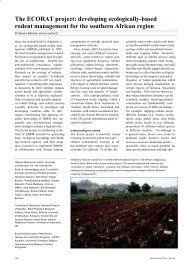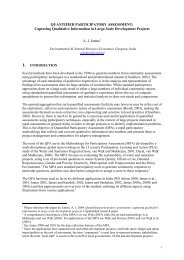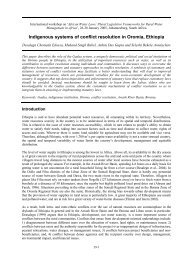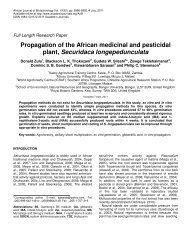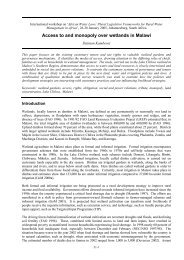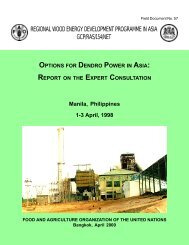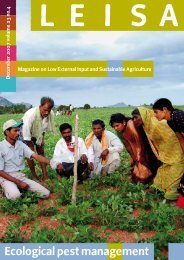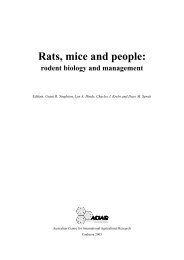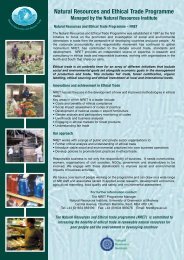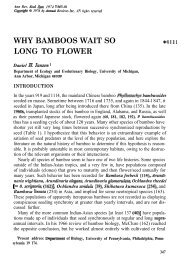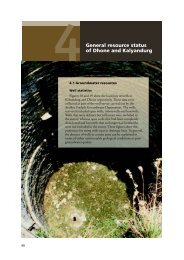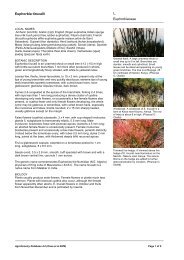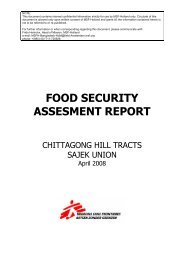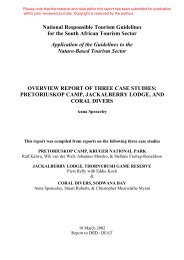Access to Rural Non-Farm Livelihoods - Natural Resources Institute
Access to Rural Non-Farm Livelihoods - Natural Resources Institute
Access to Rural Non-Farm Livelihoods - Natural Resources Institute
You also want an ePaper? Increase the reach of your titles
YUMPU automatically turns print PDFs into web optimized ePapers that Google loves.
Box 17. Mary Opus, Traditional Birthing Attendant<br />
Mary is 46 years old, and a widow. She lives with eight of her children, five of whom are<br />
adults, and two of her grandsons, sons of two of the daughters. Although only formally<br />
educated <strong>to</strong> P1, Mary is a trained TBA. She was originally trained by her mother, who also<br />
practised traditional midwifery, but in the early 1990s she was identified as a “good”<br />
traditional practitioner, and given “official” training in Masaka, and certified. She buys rubber<br />
gloves, cot<strong>to</strong>n wool, bedding, etc. from the hospital in Rakai, spending about 50,000 shillings<br />
per quarter on materials and transport. Women come long distances for her services as she is<br />
the only officially trained and certified TBA in the area. She charges 1,000 shillings for a<br />
basic antenatal check-up, and 5,000 shillings <strong>to</strong> stay for delivery. However, as women often<br />
do not bring essential commodities such as soap or paraffin, she has provide these, so her<br />
profit is very little, perhaps only 5,000 shillings per quarter. She needs more bedding in<br />
particular, but lacks the money – once, in 1990, she received a blanket from the Ki<strong>to</strong>vu<br />
Catholic Mission’s Community Based Health Care Programme, but otherwise, she has<br />
received no operational support from any government or NGO programmes. She would also<br />
like <strong>to</strong> build a separate building for the women <strong>to</strong> deliver in, as currently the women stay in<br />
the children’s room, and then the children have <strong>to</strong> sleep elsewhere. Mary’s work as a TBA is<br />
supported in part by making and selling baskets. She is a member of the Kitambuza Women’s<br />
Group 108 but also works on her own making fancy multi-coloured baskets for decoration for<br />
sale <strong>to</strong> well off women in the village. This work is highly skilled, and supply is limited in<br />
relation <strong>to</strong> demand, in contrast <strong>to</strong> that for the more utilitarian baskets made by the group and<br />
others. Mary works and sells quickly, sometimes making and selling as many as 20 baskets in<br />
a month. She could make even more if she could invest in more raw materials, but she has<br />
many other demands on her resources. Some of the other members of the group are jealous of<br />
her skills and her extra -group activity, but others feel that handicrafts are somewhat tiresome<br />
and take <strong>to</strong>o long for <strong>to</strong>o little reward 109 and thus have nothing against her working for herself<br />
as well. Mary’s adult children all farm, including growing coffee for sale. Mary used <strong>to</strong> farm<br />
<strong>to</strong>o, but has had <strong>to</strong> s<strong>to</strong>p as she had an operation last year and can no longer do heavy physical<br />
work. She also used be a coffee buyer in season, working for traders who came <strong>to</strong> Lwentulege<br />
and gave her money <strong>to</strong> go from farm <strong>to</strong> farm buying coffee, but again, has had <strong>to</strong> s<strong>to</strong>p as a<br />
result of her health. She would like <strong>to</strong> start trading in second hand clothes, but is lacking<br />
capital. She sees her household as “poor”, because it is so big – if it was smaller, they would<br />
be better off. Although she had already started diversifying her activities, having her operation<br />
and being unable <strong>to</strong> do heavy physical work has further encouraged her <strong>to</strong> investigate nonfarm<br />
opportunities.<br />
The services of a trained TBA are clearly very valuable <strong>to</strong> a community, and such a person is<br />
likely <strong>to</strong> have considerable social capital. In the case above, this is even more likely, as she<br />
makes very little money from her midwifery.<br />
There is also a bar in the village.<br />
Box 18. Joan Scanda, bar owner<br />
Joan is 24 years old, and has two children, aged two and three. Her husband was a fisherman,<br />
but caught malaria out on the lake and died a year ago, leaving her a widow, with 30,000<br />
shillings of “fish” money. Friends advised her <strong>to</strong> open a bar, so she returned <strong>to</strong> Kitambuza,<br />
her home area, and spent the money renting a building (which is also their home), and buying<br />
a radio, batteries, and <strong>to</strong>n<strong>to</strong>. She now spends about 40,000 shillings (~US$ 22) per week on<br />
<strong>to</strong>n<strong>to</strong>, as well as smaller amounts on enguli (locally distilled spirits), batteries for the radio,<br />
paraffin, and rent, but is able <strong>to</strong> make a profit of about 30,000 shillings per week . She has<br />
problems with childcare, as well as the occasional drunk cus<strong>to</strong>mer, but the business “earns a<br />
living” – she is now building her own home, although as a widow she has had <strong>to</strong> hire a man <strong>to</strong><br />
work for her, and thus work s<strong>to</strong>ps when she has no spare money.<br />
108 See Box 14.<br />
109 These may continue <strong>to</strong> participate in the group for its social functions.<br />
55



